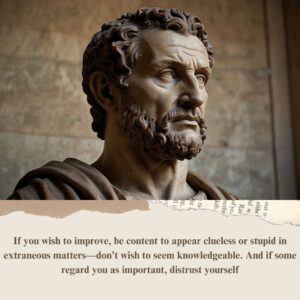Introduction to Stoicism
Stoicism is a concept gaining popularity today thanks to various podcasts and books. Many people are curious about what Stoicism really is and wonder if it’s a religion. It’s important to understand Stoicism before embracing it.

Generated Image of Marcus Aurelius.
Definition of Stoicism
Stoicism is a school of Hellenistic philosophy that teaches the development of self-control and fortitude to overcome destructive emotions. It asserts that virtue (moral excellence) is the only true good and that happiness comes from accepting the present moment, understanding the world, and fulfilling one’s role in nature’s plan.
Who Created Stoicism?
Stoicism was founded in Athens by Zeno of Citium in the early 3rd century BCE. Zeno, a merchant from Cyprus, began studying philosophy in Athens after a shipwreck. Unsatisfied with existing schools, he founded his own, the Stoa Poikile (Painted Porch), where Stoicism gets its name. Zeno’s teachings laid the foundation for Stoicism, focusing on ethics, logic, and physics.
Key Figures of Stoicism
- Chrysippus of Soli: Known as the second founder of Stoicism, Chrysippus expanded and systematized Zeno’s teachings, especially in Stoic logic, epistemology, and ethics.
- Epictetus: A former slave turned influential Stoic teacher, Epictetus emphasized practical application of Stoic principles in daily life. His teachings were recorded by his student Arrian in the “Discourses” and the “Enchiridion” (Handbook).
- Seneca: A Roman statesman, playwright, and Stoic philosopher, Seneca’s letters and essays, like “Letters to Lucilius,” offer valuable insights into Stoic ethics and practical wisdom.
- Marcus Aurelius: The Roman Emperor and Stoic philosopher, Marcus Aurelius is best known for his “Meditations,” personal writings reflecting his Stoic beliefs and efforts to live by them.
How to Practice Stoicism
To become a Stoic, follow these core principles:
- Virtue as the Highest Good: Virtue (moral excellence) is the only true good and is necessary and sufficient for happiness.
- Living According to Nature: Live in harmony with the rational order of the universe, recognizing what is within our control and what is not.
- Emotional Resilience: Do not be controlled by desires and fears; maintain equanimity regardless of external circumstances.
- Practical Wisdom: Use reason and wisdom to make ethical decisions and lead a fulfilling life.
Who is a Stoic Person?
A Stoic person or Stoic Men follows the core principles of Stoicism and doesn’t get carried away by emotions. They remain calm even in tough situations and act rationally.
Stoicism in One Line
Stoicism: A philosophy that teaches the pursuit of wisdom and virtue by living in harmony with nature and accepting what is beyond our control.
Lessons from Stoicism
- Focus on What You Can Control: Concentrate on your thoughts, actions, and attitudes rather than external events or others’ opinions.
- Practice Negative Visualization: Regularly imagine losing the things you value to appreciate what you have more deeply and become more resilient to potential losses.
- Cultivate virtue and wisdom: Stoics considered virtue (comprising wisdom, justice, courage, and self-control) as the highest good. They believed that by developing these qualities, one could achieve eudaimonia, or a state of human flourishing.
- Accept things as they are: This principle, known as “amor fati” (love of fate), encourages embracing all of life’s events, both good and bad, as necessary and beneficial for personal growth.
- Live in accordance with nature and reason: Stoics advocated for living in harmony with the natural order of the universe and using reason to guide our actions and judgments.
- Memento mori (remember death): Reflecting on the inevitability of death to prioritize what truly matters in life.
- Practice self-discipline: Regularly denying yourself certain pleasures to strengthen your will and appreciate life’s simple joys.
- Cultivate mindfulness: Being present in the moment and aware of your thoughts and actions.
- Accept Things as They Are: Embrace all life events, good or bad, as necessary for personal growth, known as “amor fati” (love of fate).
- Live in Accordance with Nature and Reason: Live in harmony with the natural order of the universe and use reason to guide actions and judgments.
- Memento Mori (Remember Death): Reflect on the inevitability of death to prioritize what truly matters in life.
- Practice Self-Discipline: Regularly deny yourself certain pleasures to strengthen your will and appreciate life’s simple joys.
- Cultivate Mindfulness: Be present in the moment and aware of your thoughts and actions.
Stoicism Books for Beginners
If you’re interested in learning more about Stoicism, here are some recommended books for beginners:
Check My Article On Hamster Kombat Which Will tell full details regarding hamster kombat.
Stoic Quotes With Images



Epictetus and Stoicism
Epictetus is one of the key figures in Stoicism, and his lessons are widely followed today. As a former slave turned influential teacher, Epictetus’s practical teachings continue to inspire many in the practice of Stoicism.
Leave a Reply